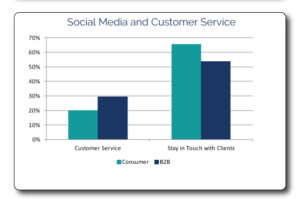Social media has given customers a way to ask for help. The problem? Most companies aren’t listening. It’s a surprising trend- it should be natural for brands to jump on Twitter, Facebook, LinkedIn or YouTube to answer product or service questions in real time as a way to short-circuit an otherwise lengthy process. While it seems logical, small businesses seem slow to embrace the concept.
Connecting is not the Same as Service
In o ur 2014 small business survey, we asked small businesses about their social media objectives. Both business to business (B2B) and business to consumer (B2C) companies responded saying they use social media for general Customer Service and Staying in Touch with Clients. While those two categories are related, respondents in both segments clearly saw them differently.
ur 2014 small business survey, we asked small businesses about their social media objectives. Both business to business (B2B) and business to consumer (B2C) companies responded saying they use social media for general Customer Service and Staying in Touch with Clients. While those two categories are related, respondents in both segments clearly saw them differently.
Both B2C and B2B companies responded saying they use social media to stay in touch with clients twice as often as they use it for general customer service. For many business owners the open and free-form nature of these social media tools pose a perceived threat, since they have no true control over the messages and responses they might receive.
How They Use It
66% of B2C companies are relying on social media to stay in touch with clients. With Facebook as the platform of choice for this community, that high level of participation to stay on top of the customer’s mind makes sense. However, we can interpret from the data these same companies may be less comfortable actually dealing with customer issues on Facebook as less than 20% want to address these issues publicly.
B2B companies tell us a slightly different story. Primarily LinkedIn users, respondents engaging with clients through social media at B2B companies report higher rates of customer service than their B2C counterparts. Almost 30% of these firms are willing to to take on customer issues through social channels. But in contrast, these companies spend less time on social media staying in touch with clients relative to B2C firms.
Why aren’t more small businesses getting involved? Using Facebook for customer service has been discussed many times before, but our data shows small businesses are not taking advantage of the platform. We think you should. Consider all the time and energy you could save for whoever answers customers questions and concerns. Using Facebook to answer questions and posting links to FAQ’s may save a lengthy phone call or email.
We are not advocating for long discussions in a public forum. Take arguments offline. Apologize publicly and invite unhappy customers to talk about the issues privately.
Check out these examples of excellent customer service on Facebook. Each and every one of these companies responded promptly to the customer inquiry and saw the issue through to resolution. Social media should be the front-line for customer interaction; not just advertising and hawking your brand, but actually solving customer issues and building trust.
Does your company use social media to answer customer service inquiries? How do you feel about using Facebook as a means of reacting to consumers?
Get a copy of the full report here:
